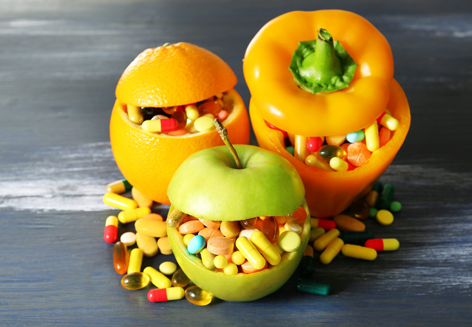Very recently, as part of health advice during Corona times, I read the recommendation to consume 4000 mg of Vitamin C daily to boost the immune response. That made me wonder, I remembered the recommendations being much lower.
So I sat down and did some reading and my memory did not betray me: the recommended dietary allowance (RDA) of vitamin C according to the DGE (German Nutrition Society) is:
- for adults at 100 milligrams
- for smokers at 150 milligrams
- for pregnant women at 110 milligrams
- for children at 60 to 90 milligrams (changes in some countries in January 2020)
Because our body is unable to store vitamin C or produce it itself, it is essential that we eat foods rich in vitamin C every day. With a well-balanced diet, we already exceed these recommendations, and easily so. The best food sources of vitamin C are fruits and vegetables and eating as little as half a cup of kiwi or bell pepper already surpasses the RDA.
The good news is: No matter how much vitamin C we consume, it won’t kill us. Vitamin C is water-soluble and hence is simply excreted in the urine when overdosed. Unlike fat-soluble vitamins, it cannot be stored in the body. Our body does not automatically absorb more vitamin C just because it is available in high doses.
The consumption of up to about 1 g of vitamin C per day in addition to the dietary intake should not be associated with harmful side effects.
Across the world, an amount of 2000 mg per day is recommended as an upper limit. People consuming this amount or more in a day often experience symptoms such as diarrhoea, indigestion, vomiting, headache and insomnia.
Hypervitaminosis is a combination of symptoms that occur when a vitamin is ingested excessively. For vitamin C it is almost impossible to ingest too much in your daily diet. However, it is not uncommon when dietary supplements or vitamin preparations are used.
A vitamin C overdose is usually not dangerous for healthy people. Because vitamin C is excreted through the kidneys, people with kidneys issues are at greater risk of overdose. Vitamin C in high concentrations can lead to an increased formation of oxalic acid and this increases the risk of urine and kidney stones.
Vitamin C improves the absorption of iron in the body. That’s why people who are at risk of iron accumulation in the body should handle vitamin C supplements with care. In their case, taking vitamin C can lead to an iron overload, which can result in serious damage to the liver, thyroid or central nervous system amongst others. People at risk include those diagnosed with Haemochromatosis and Thalassaemia Major.
Posted on April 06, 2020 by Luitgard Holzleg
This entry was posted in Blog and tagged fake recommendations, haemochromatosis, health management, hypervitaminosis, overintake, supplements, thalassaemia major, vitamin c, vitamin overload, vitamins. Bookmark the permalink.

